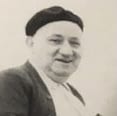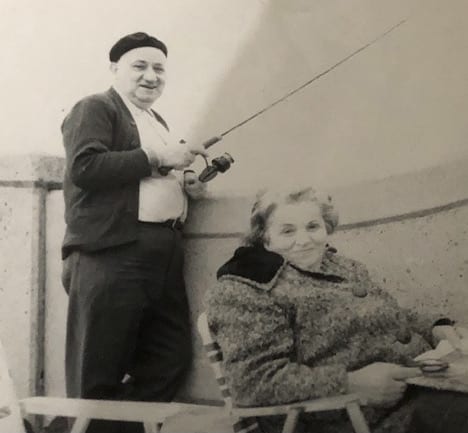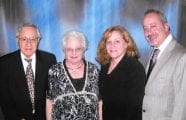- Local Survivor registry
- JOSEPH CIGE
- Local Survivor registry
- JOSEPH CIGE
Survivor Profile

JOSEPH
CIGE
(1902 - 1987)
PRE-WAR NAME:
JOSEPH CIGE
JOSEPH CIGE
PLACE OF BIRTH:
KALESH, POLAND
KALESH, POLAND
DATE OF BIRTH:
JULY 3, 1902
JULY 3, 1902
LOCATION(s) BEFORE THE WAR:
BERLIN, GERMANY
BERLIN, GERMANY
LOCATION(s) DURING THE WAR:
VICHY, FRANCE; AGDE INTERNMENT CAMP; RIVESALTES TRANSIT CAMP; GURS (AMONG the 1,000 SURVIVORS REMAINING)
VICHY, FRANCE; AGDE INTERNMENT CAMP; RIVESALTES TRANSIT CAMP; GURS (AMONG the 1,000 SURVIVORS REMAINING)
STATUS:
SURVIVOR, REFUGEE
SURVIVOR, REFUGEE
RELATED PERSON(S):
SARAH CIGE - Spouse (Deceased),
FRED CIGE - Son (Deceased),
BERT (SIGMUND) CIGE - Son (Deceased),
ETHEL BORNSTEIN - Daughter,
JANINE SABINSKY TWIN - Daughter,
JACQUELINE PREZANT TWIN - Daughter,
BRIAN CIGE - Grandson,
HILLARY CIGE POST - Granddaughter
-
BIOGRAPHY BY Nancy Gorrell
Joseph Cige was born in Kalesh, Poland in 1902 and fled to Germany to avoid the draft when he was a young man. By the law at the time, he therefore lost his Polish citizenship. According to Brian Cige (grandson) in his interview, “Joseph then went back to Poland and found Sarah, my grandmother (also from Kalesh), and he and my grandmother settled in Berlin where he became a successful tailor. By age 16, he owned a successful tailoring factory and employed German workers. With the rise of Hitler, Joseph was eventually forced to give up his factory and his house.
Joseph and Sarah had two sons, Manfred (Fred) born in 1929 and Sigmund (Bert) born one year later, and an infant daughter, Ethel. Joseph and Sarah led a middle class life in Berlin, owning a factory, having employees, and material wealth like a piano. When Kristallnacht came, Joseph arranged to be smuggled into Brussels, Belgium for safety with his son, Manfred. He was later reunited with Sarah and the rest of the family. They lived in Brussels until the bombing forced them to flee once again. This time he fled to Revel, France. Later, when he felt it was safe, he sent a signal for Sarah and the rest of the family to come to France.
After a year, the Vichy government collaborators rounded them up. They were gathered and separated by men, women and children and sent to Agde internment camp. After nine months in Agde, there was a French charitable group that offered to buy sick children and place them abroad. In his interview, Brian relates the family story. “They asked my grandparents, ‘Is it ok to do this?’ my grandmother answered, “Yes.” But it must have been a tough day for her not knowing if she would ever see her children again.” The charity brought Joseph’s sons, Manfred and Sigmund, to a church in France, and then they made their way to Spain, and Lisbon, Portugal where they were put on a boat to the United States through Ellis Island. Ultimately, they were sent to a foster home in St. Louis.
Joseph didn’t see his sons again until they were adults. After that, as far as Brian knows, his grandparents all kept moving from camp to camp in those years; they were completing the tracks to Germany when the war ended. “After the war ended, they waited in France to get to America to be reunited with their sons. Joseph, Sarah and the three sisters arrived in Brooklyn, New York in 1950 where they were reunited with their sons. The whole family resided in Brooklyn until 1971 when they moved to Somerset, New Jersey. Fred (Manfred), Joseph’s son, still lives there today (2017). Joseph passed in 1987.
Editor’s Notes:
Refer to grandson Brian Cige in Voices of the Descendants.
Refer to Historical Notes Below for Camp d’Agde and Rivesaltes
-
SURVIVOR INTERVIEW:
INTERVIEW WITH BRIAN CIGE, GRANDSON OF JOSEPH CIGE
Date: May 3, 2017
Location: Brian Cige Office
Interviewer: Nancy Gorrell
Q: Describe your grandparent’s background.
Both my grandparents were from a village called Kalesh in Poland. When my grandfather was a young man and he was going to be drafted into the Polish army, he fled to Germany. By the law at the time, he therefore lost his Polish citizenship. He then went back to Poland and found my grandmother, and he and my grandmother settled in Berlin where he became a successful tailor.Q: Did he become a German citizen?
Good question. No. The law in Germany was that you were the citizen where your father was a citizen. This was in pre-Hitler time. So my grandfather was “citizenshipless.” Even though my father was born in Berlin, he didn’t have German citizenship either. They had citizenship for the first time when they became naturalized in America.Q: Did you grandparents, Sarah and Joseph, or your father, Fred relate any stories to you about Berlin in the pre-Hitler times?
At age of 16, my grandfather had a very successful sewing factory, and he had Germans working for him, and eventually the employees complained about him because he was Jewish.Q: Did your father speak about growing up in Berlin?
Eventually, but not when I was growing up. Only when I was pushing him and taking him to 2nd generation conferences did he begin to talk about it.Q: Did your father witness Kristallnacht?
My father went to work at the tailor factory and wrote on the blackboard “No talking,” and the employees complained and the Nazi’s came. Eventually, he had to walk away and abandon his business and his house. My grandfather, my father and Bert, his brother, went ahead to find safety, and then they sent a signal to the rest of the family to come to France.Q: Where did they go in France?
They started in northern France and then went to southern France. After a year, the Vichy government collaborators rounded them up. They were gathered and separated by men and women and children and sent to an internment camp. By the time my father got to the camp, he was ten years old. He was with his father and his younger brother, Bert (Sigmund was his name in Germany).Q: What do you know about their camp experience?
While my father and brother were in Agde, there was a French Christian charitable group that offered to buy sick children, and they worked in conjunction with HIAS. They said to my grandparents, “Is it ok to do this?” and my grandmother said, “Yes.” But it must have been a tough day for her not knowing if she would ever see her children again.Q: How did your father and his brother leave Agde internment camp?
The charity arranged for my father to leave the camp and his parents behind. Eventually, they brought the Jewish kids to a church in France, and then they made their way to Spain, and then they were put on a boat to America. They entered America through Ellis Island. This was sometime in 1941.Q: What do you know about your father and his brother’s Ellis Island experience?
There was a charity that met them at Ellis Island and then took them to foster families in St. Louis. He was in the Ellis Island hospital for a week. And his brother went ahead without him. They were separated and my father as a young boy was completely alone. Their names were changed for them in Ellis Island too—to Americanize them—so Sigmund became Bert and Manfred became Fred.Q: Did father talk to you about this experience?
Not a lot. He did not want to relive it. He did not wanting to put that information in his children’s heads.Q: Who were his foster parents?
My father and uncle Bert bounced around from foster home to foster home from the time they were about 12 years old until they were 21. And then Grandma and Grandpa arrived in Brooklyn and then they had to leave St. Louis and go to a new place—New York City to live in a small cramped apartment with siblings they didn’t know—the twins born in the camp. It had been more than a decade since he had seen his younger sisters.Q: What happened to the siblings left behind?
My grandmother was in Rivesaltes transit camp. She heard if you were pregnant, they wouldn’t deport you. So she got pregnant. The twins were born in Rivesaltes after my father left, so he had never met them. Twin girls, Janine and Jacqueline. His younger sister was in the first camp; she was probably about four or five years younger than him. They all kept moving from camp to camp in those years, and they were completing the tracks to Germany when the war ended.Q: Did your grandparents have trouble getting to America? What happened to your remaining family?
My grandparents came to the United States in 1950. I think they stayed in France waiting to get to the US where they could reunite with my father and uncle.Q: How did your father meet your mother?
I think that they were on vacation in Canada somewhere. She was from Boston. I think it was 1955. They married when he was 26 years old. I was born in 1959. The family was living in Brooklyn.Q: How long did your family reside in Brooklyn?
Until 1971, when the whole family moved to Somerset, New Jersey, Franklin Township where my father still lives today (2017). My grandparents passed around 1986 or 1987. -
HISTORICAL NOTES:
French Administered Detention Camps: In March 1941, the Vichy government created a central agency, the General Commissariat for Jewish Affairs to coordinate anti-Jewish legislation and policy. Aryanization left most Jews in France destitute, affecting foreign Jews particularly severely. French authorities interned thousands of Jews under deplorable conditions in French-administered detention camps—Gurs, Saint-Cyprien, Rivesaltes, Le Vernet, and Les Milles—where at least 3,000 individuals died during the war years.
FRENCH TRANSIT CAMP
Rivesaltes was perhaps the most active transit camp. The first internees arrived there on January 7, 1941. When it reached its peak population that year, Rivesaltes had 8,000 prisoners, an estimated 3,000 of whom were children (who were separated from their mothers). Thousands of Jews were shipped from Rivesaltes to Auschwitz. During one three-month period in 1942, nine convoys carried 2,313 Jews to Auschwitz.
The camp was closed in November 1942 and the approximately 1,000 internees remaining were sent to Gurs.
-
Sources and Credits:
Credits:
SSBJCC Holocaust Memorial and Education Center Survivor Registry Interview with Brian Cige, December 14, 2016, Interviewer: Nancy Gorrell; Biography by Nancy Gorrell; Digital historic and family photographs donated by Brian and Hillary Cige Post.




